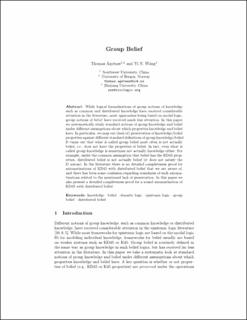Group Belief
Journal article, Peer reviewed
Accepted version
Permanent lenke
https://hdl.handle.net/11250/2753886Utgivelsesdato
2020Metadata
Vis full innførselSamlinger
Originalversjon
Lecture Notes in Computer Science (LNCS). 2020, 12061, 3-21 10.1007/978-3-030-44638-3_1Sammendrag
While logical formalizations of group notions of knowledge such as common and distributed knowledge have received considerable attention in the literature, most approaches being based on modal logic, group notions of belief have received much less attention. In this paper we systematically study standard notions of group knowledge and belief under different assumptions about which properties knowledge and belief have. In particular, we map out (lack of) preservation of knowledge/belief properties against different standard definitions of group knowledge/belief. It turns out that what is called group belief most often is not actually belief, i.e., does not have the properties of belief. In fact, even what is called group knowledge is sometimes not actually knowledge either. For example, under the common assumption that belief has the KD45 properties, distributed belief is not actually belief (it does not satisfy the D axiom). In the literature there is no detailed completeness proof for axiomatizations of KD45 with distributed belief that we are aware of, and there has been some confusion regarding soundness of such axiomatizations related to the mentioned lack of preservation. In this paper we also present a detailed completeness proof for a sound axiomatization of KD45 with distributed belief.
